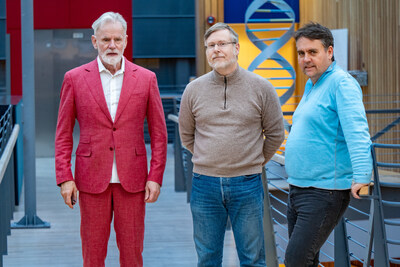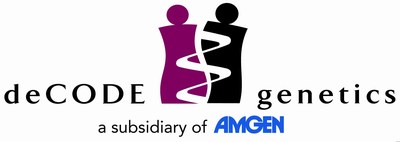deCODE genetics: Complete recombination map of the human-genome, a major step in genetics
deCODE genetics, an Amgen subsidiary, has achieved a significant breakthrough by creating the first complete recombination map of the human genome, published in Nature. The research provides important insights into how DNA is mixed during reproduction, marking a major advancement in understanding genetic diversity and its impact on health and fertility.
The groundbreaking map includes previously difficult-to-detect shorter-scale shuffling of grandparental DNA and identifies areas devoid of major reshuffling. This research helps explain why some pregnancies fail and how the genome maintains a balance between diversity and stability. The study reveals important gender differences in recombination patterns, noting that women experience increased frequency of non-crossover recombinations with age, potentially explaining higher pregnancy risks in older mothers.
This advancement is particularly relevant for fertility research, as recombination errors can lead to serious reproductive issues affecting approximately one in ten couples worldwide. The study also demonstrates that mutations are elevated near DNA mixing regions, providing new understanding of human evolution and individual health outcomes.
deCODE genetics, una sussidiaria di Amgen, ha raggiunto un significativo traguardo creando la prima mappa completa di ricombinazione del genoma umano, pubblicata su Nature. La ricerca fornisce importanti intuizioni su come il DNA venga mescolato durante la riproduzione, segnando un grande progresso nella comprensione della diversità genetica e del suo impatto sulla salute e la fertilità.
La mappa innovativa include un mescolamento su scala più ridotta del DNA nonno, precedentemente difficile da rilevare, e identifica aree prive di importanti rimescolamenti. Questa ricerca aiuta a spiegare perché alcuni gravidanze falliscono e come il genoma mantenga un equilibrio tra diversità e stabilità. Lo studio rivela importanti differenze di genere nei modelli di ricombinazione, notando che le donne sperimentano un aumento della frequenza delle ricombinazioni non incrociate con l'età, spiegando potenzialmente i maggiori rischi di gravidanza nelle madri più anziane.
Questo progresso è particolarmente rilevante per la ricerca sulla fertilità, poiché gli errori di ricombinazione possono portare a seri problemi riproduttivi che colpiscono circa una coppia su dieci in tutto il mondo. Lo studio dimostra anche che le mutazioni sono elevate vicino alle regioni di mescolamento del DNA, fornendo nuove comprensioni sull'evoluzione umana e sugli esiti di salute individuali.
deCODE genetics, una subsidiaria de Amgen, ha logrado un avance significativo al crear el primer mapa de recombinación completo del genoma humano, publicado en Nature. La investigación proporciona importantes conocimientos sobre cómo se mezcla el ADN durante la reproducción, marcando un gran avance en la comprensión de la diversidad genética y su impacto en la salud y la fertilidad.
El mapa pionero incluye una mezcla de ADN de abuelos a escala más corta, que antes era difícil de detectar, e identifica áreas sin remezcla importante. Esta investigación ayuda a explicar por qué algunos embarazos fallan y cómo el genoma mantiene un equilibrio entre diversidad y estabilidad. El estudio revela importantes diferencias de género en los patrones de recombinación, señalando que las mujeres experimentan una mayor frecuencia de recombinaciones no cruzadas a medida que envejecen, lo que potencialmente explica los mayores riesgos de embarazo en madres mayores.
Este avance es particularmente relevante para la investigación sobre la fertilidad, ya que los errores de recombinación pueden provocar problemas reproductivos graves que afectan a aproximadamente una de cada diez parejas en todo el mundo. El estudio también demuestra que las mutaciones son más elevadas cerca de las regiones de mezcla de ADN, proporcionando una nueva comprensión de la evolución humana y los resultados de salud individuales.
deCODE genetics는 Amgen의 자회사로, Nature에 발표된 인간 게놈의 첫 번째 완전 재조합 지도를 작성하여 중요한 돌파구를 마련했습니다. 이 연구는 DNA가 출산 과정에서 어떻게 섞이는지에 대한 중요한 통찰을 제공하며, 유전자 다양성 이해와 건강과 생식에 미치는 영향에서 큰 진전을 나타냅니다.
이 혁신적인 지도는 이전에 감지하기 어려웠던 조부모 DNA의 짧은 규모의 혼합을 포함하며, 주요 재혼합이 없는 구역을 식별합니다. 이 연구는 일부 임신이 실패하는 이유와 게놈이 다양성과 안정성 간의 균형을 유지하는 방법을 설명하는 데 도움을 줍니다. 연구는 성별에 따른 재조합 패턴의 중요한 차이를 드러내며, 여성들은 나이에 따라 비교합 재조합 빈도가 증가함을 보여주어, 나이가 많은 어머니들의 높은 임신 위험을 설명하는 데 기여할 수 있습니다.
이 발전은 생식 연구에 특히 중요하며, 재조합 오류는 전 세계에서 약 10 쌍 중 한 쌍에 영향을 미치는 심각한 생식 문제를 초래할 수 있습니다. 이 연구는 또한 그 지역 근처에서 돌연변이가 증가한다는 것을 보여주어, 인간 진화와 개인 건강 결과에 대한 새로운 이해를 제공합니다.
deCODE genetics, une filiale d'Amgen, a réalisé une avancée significative en créant la première carte de recombinaison complète du génome humain, publiée dans Nature. La recherche fournit des perspectives importantes sur la manière dont l'ADN est mélangé lors de la reproduction, marquant un progrès majeur dans la compréhension de la diversité génétique et de son impact sur la santé et la fertilité.
La carte révolutionnaire comprend un mélange de l'ADN des grands-parents, auparavant difficile à détecter sur une échelle plus courte, et identifie des zones dénuées de remaniement majeur. Cette recherche aide à expliquer pourquoi certaines grossesses échouent et comment le génome maintient un équilibre entre diversité et stabilité. L'étude révèle d'importantes différences de sexe dans les modèles de recombinaison, notant que les femmes connaissent une fréquence accrue de recombinaisons non croisée avec l'âge, ce qui pourrait expliquer les risques plus élevés de grossesse chez les mères plus âgées.
Cette avancée est particulièrement pertinente pour la recherche sur la fertilité, car les erreurs de recombinaison peuvent entraîner de graves problèmes reproductifs touchant environ un couple sur dix dans le monde. L'étude montre également que les mutations sont élevées près des régions de mélange de l'ADN, fournissant une nouvelle compréhension de l'évolution humaine et des résultats de santé individuels.
deCODE genetics, eine Tochtergesellschaft von Amgen, hat einen bedeutenden Durchbruch erzielt, indem sie die erste vollständige Rekombinationskarte des menschlichen Genoms erstellt hat, die in Nature veröffentlicht wurde. Die Forschung bietet wichtige Einblicke, wie DNA während der Fortpflanzung gemischt wird, was einen großen Fortschritt im Verständnis der genetischen Vielfalt und deren Auswirkungen auf Gesundheit und Fruchtbarkeit darstellt.
Die wegweisende Karte umfasst zuvor schwer nachweisbare kürzere Mischeffekte von Großeltern-DNA und identifiziert Bereiche ohne wesentliche Rekombination. Diese Forschung hilft zu erklären, warum einige Schwangerschaften fehlschlagen und wie das Genom ein Gleichgewicht zwischen Vielfalt und Stabilität aufrechterhält. Die Studie zeigt wichtige Geschlechtsunterschiede in den Rekombinationsmustern und stellt fest, dass Frauen mit zunehmendem Alter eine höhere Häufigkeit nicht-Crossover-Rekombinationen erleben, was möglicherweise die höheren Risiken bei schwangeren älteren Frauen erklärt.
Dieser Fortschritt ist besonders relevant für die Fruchtbarkeitsforschung, da Rekombinationsfehler zu ernsthaften Fortpflanzungsproblemen führen können, die weltweit etwa ein Paar von zehn betreffen. Die Studie zeigt auch, dass Mutationen in der Nähe von DNA-Mischregionen erhöht sind und bietet ein neues Verständnis der menschlichen Evolution und individueller Gesundheitsausgänge.
- Publication in prestigious Nature journal enhances scientific credibility
- First-of-its-kind complete human genome recombination map strengthens AMGN's leadership in genetic research
- Research findings could lead to new fertility treatments and diagnostic tools
- Advances understanding of pregnancy complications and genetic disorders, opening potential new market opportunities
- None.
Insights
deCODE genetics, Amgen's wholly-owned subsidiary, has achieved a remarkable breakthrough in genetic research that could significantly impact the company's future growth trajectory. The development of the first complete human DNA recombination map, published in Nature, represents a major scientific milestone with substantial commercial implications.
Think of DNA recombination like shuffling a deck of cards - it's how genetic material gets mixed during reproduction. This new map doesn't just show the big shuffles (crossovers) but also captures the subtle rearrangements (non-crossovers) that were previously hard to detect. For the first time, we can see the entire 'shuffling process' in unprecedented detail.
The research has three key commercial implications:
- Enhanced fertility treatments: By understanding why some genetic combinations fail during reproduction, Amgen could develop more effective fertility treatments, targeting a global market where approximately 10% of couples face infertility challenges.
- Improved genetic testing: The identification of DNA regions that resist reshuffling could lead to better diagnostic tools for pregnancy complications and genetic disorders.
- Drug development opportunities: Understanding how genetic variations arise and affect health outcomes could accelerate Amgen's drug discovery process and lead to more targeted therapies.
The age-related findings in female recombination patterns are particularly significant for the growing market of advanced maternal age pregnancy care. This could lead to new diagnostic tools and treatments for age-related fertility issues, representing a substantial market opportunity given global demographic trends toward delayed parenthood.
For Amgen investors, this breakthrough strengthens the company's position in genetic research and could accelerate its pipeline development across multiple therapeutic areas. While immediate revenue impact may be , the long-term potential for commercializing these insights through new diagnostic tools, fertility treatments and targeted therapeutics could provide significant future growth opportunities.
Scientists at deCODE genetics/Amgen have constructed a complete map of how human DNA is mixed as it is passed down during reproduction. The map marks a major step in the understanding of genetic diversity and its impact on health and fertility. It continues 25 years of research at deCODE genetics into how new diversity is generated in the human genome, and its relationship to health and disease.
The new map, appearing today in the online edition of Nature, is the first to incorporate shorter-scale shuffling, (non crossover) of grandparental DNA, which is difficult to detect due to the high DNA sequence similarity. The map also identifies areas of DNA that are devoid of major reshuffling, likely to protect critical genetic functions or prevent chromosomal problems. This insight offers a clearer picture of why some pregnancies fail and how the genome balances diversity with stability.
While this shuffling, known as recombination, is essential for genetic diversity, errors in the process can lead to serious reproductive issues. These failures can result in genetic errors that prevent pregnancies from continuing, helping to explain why infertility affects around one in ten couples worldwide. Understanding this process offers new hope for improving fertility treatments and diagnosing pregnancy complications.
The research also reveals key differences between men and women in how and where, the genome recombination occurs. Women have fewer non-crossover recombinatios, but their frequency increases with age, which may help explain why older maternal age is associated with higher risks of pregnancy complications and chromosomal disorders of the child. Men, however, do not show this age-related change, although recombination in both sexes can contribute to mutations passed to offspring.
Understanding the recombination process is also important in understanding how humans evolved as a species and what shapes individual differences, including health outcomes. All human genetic diversity can be traced to recombination and de novo mutations, DNA sequence present in the child but not in the parents. The map shows that mutations are elevated near regions of DNA mixing and consequently that the two processes are highly correlated.
Based in
Video for public use:
https://vimeo.com/1037862873/90309f69c3
Video - https://mma.prnewswire.com/media/2600841/Kari_and_Bjarni.mp4
Photo - https://mma.prnewswire.com/media/2600840/Kari_Gunnar_Bjarni.jpg
Logo - https://mma.prnewswire.com/media/1535464/deCODE_genetics_Amgen_Logo.jpg
![]() View original content to download multimedia:https://www.prnewswire.com/news-releases/decode-genetics-complete-recombination-map-of-the-human-genome-a-major-step-in-genetics-302354552.html
View original content to download multimedia:https://www.prnewswire.com/news-releases/decode-genetics-complete-recombination-map-of-the-human-genome-a-major-step-in-genetics-302354552.html
SOURCE deCODE genetics









